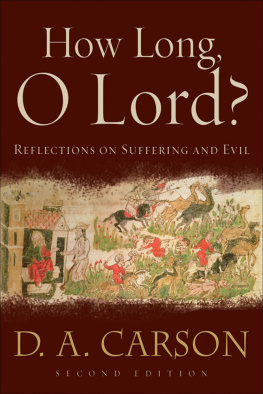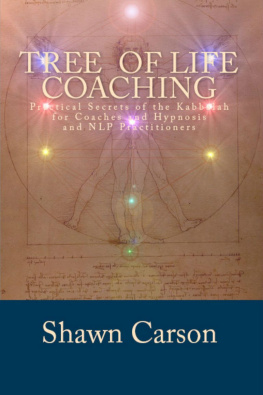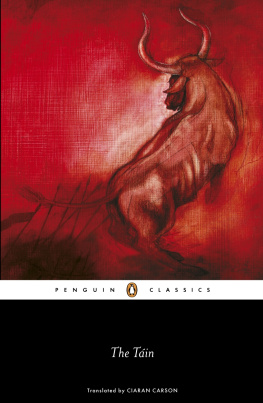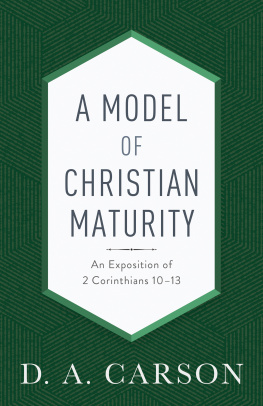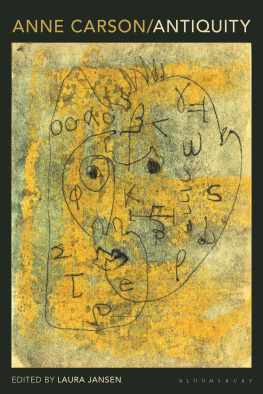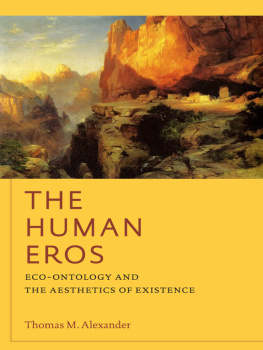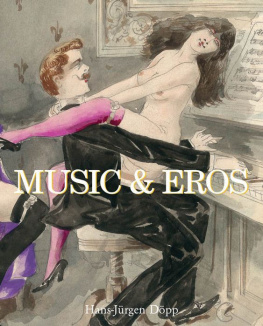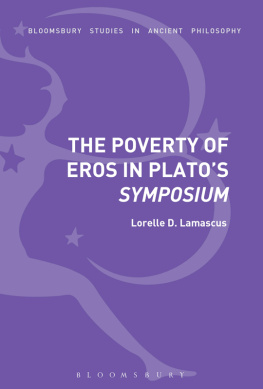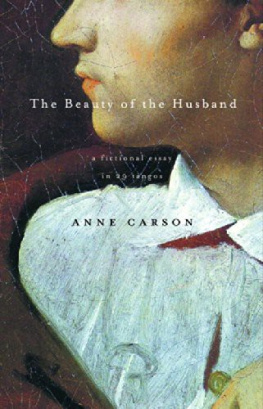
EROS THE BITTERSWEET
Published for the Center for Hellenic Studies
Anne Carson
EROS
THE BITTERSWEET
An Essay
PRINCETON UNIVERSITY PRESS
Copyright 1986 by Princeton University Press
Published by Princeton University Press, 41 William Street, Princeton, New Jersey 08540
In the United Kingdom: Princeton University Press, Guildford, Surrey
All Rights Reserved
Library of Congress Cataloging in Publication Data will be found on the last printed page of this book
First Princeton Paperback printing, 1988
Publication of this book has been aided by a grant from The Andrew W. Mellon Foundation
This book has been composed in Linotron Sabon and Weiss
Clothbound editions of Princeton University Press books are printed on acid-free paper, and binding materials are chosen for strength and durability
Printed in the United States of America by Princeton University Press Princeton, New Jersey
DESIGNED BY LAURY A. EGAN
Abbreviations
Aesch. | Aeschylus |
Ag. | Agamemnon |
PV | Prometheus Bound |
Sept. | Seven against Thebes |
Supp. | Suppliants |
Anac. | Elegy and Iambus with the Anacreontea, ed. J. M. Edmonds (Cambridge, Mass., 1961) |
Anth. Pal. | The Greek Anthology, ed. W. R. Paton, 5 vols. (London and New York, 1916) |
Ap. Rhod. | Apollonius Rhodius, Argonautica, ed. R. C. Seaton (Oxford, 1900) |
Ar. | Aristophanes |
Eccl. | Ecclesiazusae |
Nub. | Clouds |
Ran. | Frogs |
Arist. | Aristotle |
De An. | On the Soul |
Metapb. A | Metaphysics A |
Ph. | Physics |
Poet. | Poetics |
Pol. | Politics |
Rb. | Rhetoric |
Sens. | On the Senses |
Ath. | Athenaios, Deipnosophistae, ed. G. Kaibel, 3 vols. (Leipzig, 1887-1890) |
CAF | Comicorum Atticorum Fragmenta, ed. T. Kock, 3 vols. (Leipzig, 1880-1888) |
Diels, VS. | Die Fragmente der Vorsokratiker, ed. H. Diels, 3 vols. (Berlin, 1959-1960) |
Eur. | Euripides |
Hipp. | Hippolytus |
IA | Iphigeneia at Aulis |
Sthen. | Sthenoboea |
FGrH | Fragmenta Graecorum Historicorum, ed. F. Jacoby, 15 vols. (Berlin and Leiden, 1923-1958) |
Hilgard, Gramm. Gr. | Grammatici Graeci, ed. A. Hilgard, 3 vols. (Leipzig, 1901) |
Hom. | Homer |
Il. | Iliad |
Od. | Odyssey |
LP | Poetarum Lesbiorum Fragmenta, ed. E. Lobel and D. Page (Oxford, 1955) |
LSJ | Liddell and Scott, Greek-English Lexicon, 9th ed., rev. Jones (Oxford, 1968) |
Pind. | Pindar |
Pyth. | Pythian Odes |
Pl. | Plato |
Ap. | Apology |
Phdr. | Phaedrus |
Phlb. | Philebus |
Soph. | Sophist |
Symp. | Symposium |
Theag. | Theages |
Tht. | Theaetetus |
PMG | Poetae Melici Graeci, ed. D. Page (Oxford, 1962) |
Rack | Tragicorum Graecorum Fragmenta IV: Sophocles, ed. S. Radt (Gttingen, 1977) |
Snell-Maehler | Pindari Carmina cum Fragmentis, ed. B. Snell and H. Maehler, 2 vols. (Leipzig, 1971) |
Soph. | Sophokles |
Ant. | Antigone |
OC | Oedipus at Colonus |
Trach. | Trachiniae |
Stob., Flor. | Ioannis Stobaei Florilegium, ed. T. Gaisford, 4 vols. (Oxford, 1822) |
TGF | Tragicorum Graecorum Fragmenta, ed. A. Nauck, 2nd ed. (Leipzig, 1889) |
West, IEG | Iambi et Elegi Graeci, ed. M. L. West, 2 vols. (Oxford, 1971-1972) |
Preface
Kafkas The Top is a story about a philosopher who spends his spare time around children so he can grab their tops in spin. To catch a top still spinning makes him happy for a moment in his belief that the understanding of any detail, that of a spinning top for instance, was sufficient for the understanding of all things. Disgust follows delight almost at once and he throws down the top, walks away. Yet hope of understanding continues to fill him each time top-spinning preparations begin among the children: as soon as the top began to spin and he was running breathlessly after it, the hope would turn to certainty but when he held the silly piece of wood in his hand he felt nauseated.
The story is about the delight we take in metaphor. A meaning spins, remaining upright on an axis of normalcy aligned with the conventions of connotation and denotation, and yet: to spin is not normal, and to dissemble normal uprightness by means of this fantastic motion is impertinent. What is the relation of impertinence to the hope of understanding? To delight?
The story concerns the reason why we love to fall in love. Beauty spins and the mind moves. To catch beauty would be to understand how that impertinent stability in vertigo is possible. But no, delight need not reach so far. To be running breathlessly, but not yet arrived, is itself delightful, a suspended moment of living hope.
Suppression of impertinence is not the lovers aim. Nor can I believe this philosopher really runs after understanding. Rather, he has become a philosopher (that is, one whose profession is to delight in understanding) in order to furnish himself with pretexts for running after tops.
Princeton, New Jersey
August 1985
EROS THE BITTERSWEET
Bittersweet
It was Sappho who first called eros bittersweet. No one who has been in love disputes her. What does the word mean?
Eros seemed to Sappho at once an experience of pleasure and pain. Here is contradiction and perhaps paradox. To perceive this eros can split the mind in two. Why? The components of the contradiction may seem, at first glance, obvious. We take for granted, as did Sappho, the sweetness of erotic desire; its pleasurability smiles out at us. But the bitterness is less obvious. There might be several reasons why what is sweet should also be bitter. There may be various relations between the two savors. Poets have sorted the matter out in different ways. Sapphos own formulation is a good place to begin tracing the possibilities. The relevant fragment runs:
Next page


